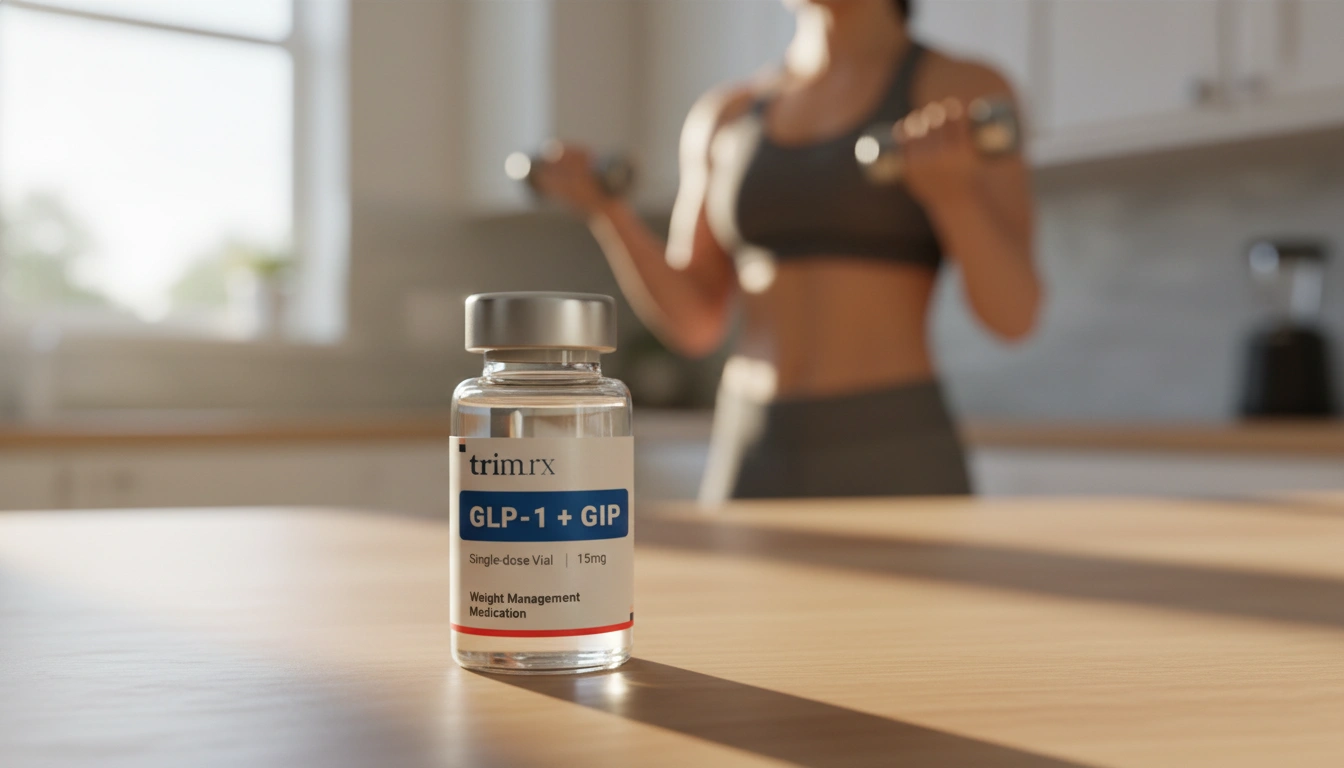Which GLP-1 Causes Least Nausea? A Comprehensive Exploration

Introduction
Have you ever found yourself avoiding medication due to potential side effects, particularly nausea? You’re not alone. Nausea is one of the most common side effects associated with glucagon-like peptide-1 (GLP-1) receptor agonists, a class of medications increasingly used for weight management and diabetes treatment. With a reported 30-40% of patients experiencing nausea when taking these medications, understanding which GLP-1 causes the least nausea is critical for many looking to manage their weight effectively while minimizing unpleasant symptoms.
As we navigate the world of GLP-1 medications, it’s essential to understand how they work, the reasons behind nausea, and which specific formulations might offer a more tolerable experience. In this blog post, we aim to provide clarity on GLP-1 medications, emphasizing the nuances of nausea and how it varies among different options available on the market.
By the end of this post, you’ll gain insight into the various GLP-1 medications, their effectiveness for weight loss, and how we at TrimRx can support you on your weight loss journey with personalized solutions that consider your unique needs.
We’ll cover the following topics:
- An overview of GLP-1 medications and their mechanisms.
- A comparison of the available GLP-1 medications regarding nausea.
- Insights from recent research on managing nausea.
- How TrimRx’s personalized weight loss programs can assist you.
Together, we will explore the landscape of GLP-1 medications and help you make an informed choice that aligns with your health goals.
Understanding GLP-1 Medications
Glucagon-like peptide-1 (GLP-1) is a hormone produced in the intestines that plays a pivotal role in glucose metabolism and appetite regulation. GLP-1 receptor agonists are synthetic versions of this hormone that mimic its effects, making them a powerful tool in treating type 2 diabetes and obesity.
Mechanisms of Action
GLP-1 medications work by:
- Stimulating Insulin Secretion: They promote the release of insulin in response to high blood sugar levels, helping to lower glucose levels effectively.
- Inhibiting Glucagon Release: Glucagon is a hormone that raises blood sugar levels; by inhibiting its release, GLP-1 medications help maintain stable glucose levels.
- Slowing Gastric Emptying: This leads to increased satiety, meaning you feel fuller for longer, which can aid in weight loss.
While these mechanisms lead to effective weight management, the same processes can also contribute to gastrointestinal side effects, particularly nausea.
Common Side Effects
The primary side effects associated with GLP-1 medications include:
- Nausea
- Vomiting
- Diarrhea
- Constipation
Nausea is particularly prevalent among users, affecting their adherence to treatment. Understanding which GLP-1 medications cause less nausea can be pivotal in enhancing compliance and overall satisfaction with treatment options.
Comparing GLP-1 Medications: Nausea Incidence
Several GLP-1 medications are available, each with unique formulations and dosing regimens. The most commonly prescribed include:
- Semaglutide (Ozempic®, Wegovy®)
- Liraglutide (Victoza®, Saxenda®)
- Dulaglutide (Trulicity)
- Exenatide (Byetta®, Bydureon®)
- Tirzepatide (Mounjaro®, Zepbound®)
Nausea Rates in Different GLP-1 Medications
- Semaglutide (Ozempic® and Wegovy®):
- Nausea is common, especially during dose escalation. However, many users report that nausea tends to decrease over time as the body acclimates to the medication.
- Liraglutide (Victoza® and Saxenda®):
- This medication also has a significant incidence of nausea, with some studies indicating that it may have a higher rate of gastrointestinal side effects compared to semaglutide.
- Dulaglutide (Trulicity):
- Generally reported to have lower rates of nausea compared to liraglutide and semaglutide, making it a favorable option for many patients.
- Exenatide (Byetta® and Bydureon®):
- This medication has shown varying rates of nausea, with the extended-release formulation (Bydureon®) typically associated with less nausea compared to the immediate-release formulation (Byetta®).
- Tirzepatide (Mounjaro® and Zepbound®):
- As a newer medication combining GLP-1 and GIP, early reports suggest it may also cause nausea, but ongoing studies are needed to fully understand its side effect profile.
Research Insights on Nausea Management
A recent study focused on the neurological underpinnings of nausea associated with GLP-1 medications, identifying specific neurons in the brain that could mediate appetite suppression without causing nausea. This research shows promise for developing future medications that may offer effective weight loss with fewer gastrointestinal side effects.
Moreover, practical strategies can help mitigate nausea for those taking GLP-1 medications:
- Gradual Dose Escalation: Starting with lower doses and slowly increasing can help the body adjust.
- Dietary Modifications: Smaller meals that avoid high-fat or spicy foods can minimize nausea.
- Hydration: Staying adequately hydrated can reduce the severity of nausea.
TrimRx’s Personalized Weight Loss Solutions
At TrimRx, our journey began with a shared vision to help individuals embrace healthier lifestyles through personalized care and cutting-edge telehealth innovations. We understand that each individual’s journey is unique, and our clinically proven weight loss solutions are designed to address those specific needs.
Our Approach
- Personalized Assessments: We offer a free assessment quiz to help determine your eligibility for prescription weight loss medications tailored to your health profile.
- Medically Supervised Programs: Our programs provide comprehensive support, including doctor consultations, medication management, lab work, and unlimited access to our health coaches.
- Compassionate Care: We prioritize empathy and transparency in all interactions, ensuring you feel supported throughout your weight loss journey.
If you’re considering a GLP-1 medication for weight loss, we encourage you to take our free assessment quiz and discover how our personalized approach can help you achieve your goals.
Additionally, our quick-access supplements like GLP-1 Daily Support and Weight Loss Boost can be valuable allies on your weight loss journey.
Conclusion
Navigating the world of GLP-1 medications can be daunting, particularly when considering side effects like nausea. Understanding which GLP-1 causes the least nausea is crucial for those seeking effective weight loss solutions without compromising quality of life.
By reviewing the mechanisms and comparing the available GLP-1 medications, we can conclude that while no medication is entirely free of side effects, options like dulaglutide and certain formulations of semaglutide may present lower nausea incidence for many individuals.
Our commitment at TrimRx is to provide you with personalized, empathetic care to help you achieve sustainable weight loss in a supportive environment. We invite you to explore our personalized assessment quiz and consider our quick-access supplements to enhance your weight loss journey.
FAQ
What are GLP-1 medications?
GLP-1 medications are synthetic versions of the GLP-1 hormone that help regulate insulin secretion, suppress glucagon release, and slow gastric emptying, promoting weight loss and better blood sugar control.
Which GLP-1 medication has the least nausea?
Dulaglutide is generally associated with lower rates of nausea compared to semaglutide and liraglutide, making it a potentially better option for those sensitive to gastrointestinal side effects.
How can I manage nausea when taking GLP-1 medications?
Strategies include starting with lower doses, gradually increasing as tolerated, eating smaller meals, staying hydrated, and avoiding high-fat foods.
How can TrimRx help me on my weight loss journey?
TrimRx provides personalized, medically supervised weight loss programs tailored to your unique needs, including consultations, medication management, and ongoing support.
Can I take supplements while on GLP-1 medications?
Yes, quick-access supplements like GLP-1 Daily Support and Weight Loss Boost can be helpful in supporting your overall wellness during your weight loss journey.

Transforming Lives, One Step at a Time
Keep reading
China’s Supreme Court Upholds Semaglutide Patent for Novo Nordisk
China’s Supreme People’s Court upholds Novo Nordisk’s semaglutide compound patent, supporting IP protection.
Over 600,000 Californians Risk Losing Access to GLP-1 Weight-Loss Drugs
California’s Medi-Cal will stop covering GLP-1 weight-loss drugs for weight-loss-only prescriptions, effective Jan. 1, 2026.
Weight-Loss Pill Approval Likely to Prompt Overhaul of Packaged Food and Fast-Food Products
FDA approval of GLP-1 weight-loss pills may prompt food makers and restaurants to shift to high-protein, smaller-portion products.



